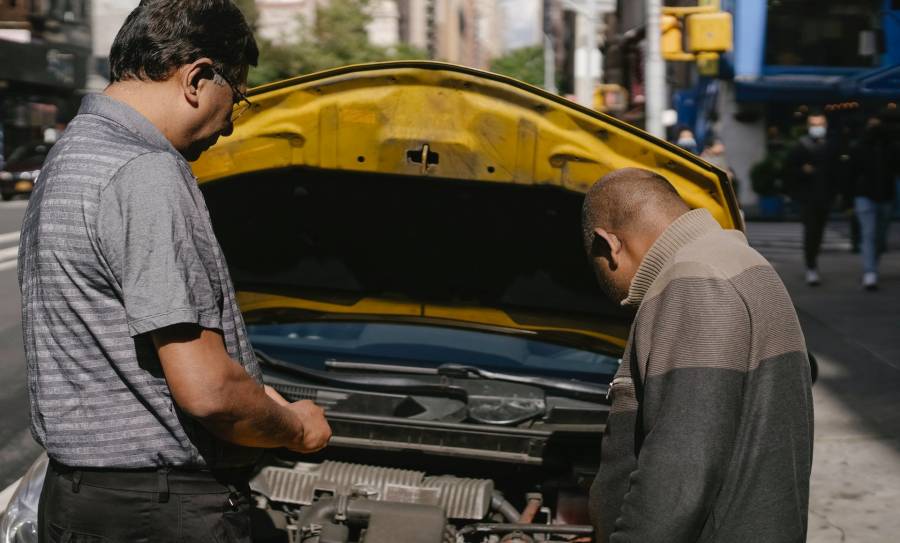Quick Navigation
When shifting from park to reverse, car jerking could indicate potential problems, one being a failing transmission.
The transmission is an essential component that directs the power from the engine to the wheels enabling you to accelerate. It also ensures that the wheels receive enough power per your speed desire.
Therefore, issues with the transmission are a cause for concern as it becomes difficult to start and stop your car.

As a car owner, you know the transmission needs a repair when your car jerks when shifting gears or even when the transmission becomes hard to shift.
This and other reasons behind your car jerking when shifting to reverse are discussed below.
Why Your Car Jerks When Shifting From Park To Reverse
Failing Transmission
As said earlier, the transmission is an essential component that ensures the optimal performance of your car.
The reason why your car jerks when shifting from park to reverse could be related to a worn-out or damaged transmission.
Other than car jerking when shifting gears, you can diagnose a worn-out transmission through these symptoms:
- Humming noises coming from the engine
- Fluid leaks. If there is transmission fluid leakage, you will notice a somewhat red fluid coming under the car.
- Burning smell. You know the transmission is damaged when the transmission fluid leak follows the burning smell.
- Trouble shifting gears.
- The check engine light is on.
Causes
Several things cause wear to the transmission. It includes:
- Contaminated or wrong transmission fluid. Using the wrong transmission fluid for your can cause damage to the transmission. Always use the recommended fluid by the manufactures. The transmission fluid is prone to contaminants which can damage your transmission. It’s therefore essential to regularly check the condition of the fluid. If contaminated, do not refill but replace the whole fluid.
- You have worn-out gears. Gears are bound to wear out with continued use or aging. However, using the wrong transmission fluid for your vehicle also causes the gear out quickly.
- It damaged transmission bands. Transmission bands play an important role when you want to shift gears. If worn out, they cannot function properly, and it becomes hard to go in reverse.
Solutions
If the transmission is damaged, you should have it rebuilt or replaced by a professional.
Replacing a transmission may be expensive, but it’s the only option if it’s badly damaged. Rebuilding occurs when only the damaged parts are replaced.
Low Transmission Fluid
The transmission fluid provides adequate lubrication of the mechanical parts within the transmission. It also maintains fluid pressure to move the clutch to shift gears.
If the transmission fluid levels are low, your car will not generate hydraulic pressure. It could lead to car jerking or difficulty changing gears.
Solutions
Having a leakage is one of the potential causes of low fluid levels. If you notice a red fluid beneath your vehicle, that could mean that the transmission fluid is leaking either from the seal or gasket.
If there’s a leak, you should have your vehicle serviced by professionals. It’s also important to check the fluid levels using a dipstick.
If there is no leak, refill with recommended fluid by the manufacturer.
Synchronizer Issues
Worn-out synchronizers can also cause the car to jerk when shifting to reverse. In a manual transmission, synchronizers allow the gears to align smoothly and quickly as you shift the gears from one to another.
Another synchronizer problem that can cause the car to jerk is when the synchronizer ring breaks.

If the synchronizer is faulty, you are likely to have problems with gears. Faulty synchronizers provide warning signs such as difficulty shifting gears, humming, and grinding sounds.
Solution
If there are problems with the synchronizer, an experienced mechanic can help identify the specific issue and repair it for you.
Clutch Problems
Worn-out clutch exhibits many symptoms, including difficulty to get into reverse. Issues to do with the clutch could mean that there could be a defect with the clutch plate.
It could indicate linkage malfunction or the clutch plate contamination by a leak from the crankshaft.
A defective clutch causes the car to jerk or vibrate, especially when you release the clutch. A bad clutch can be caused by damaged motor mounts or loose springs.
However, the clutch may be worn out and need to be replaced due to wear.
Solutions
A worn and damaged clutch needs to be replaced. However, if you don’t know how to maintain it, you will always have problems with your clutch.
These clutch maintenance tips may help extend their life:
- Do not use the clutch to support your foot. Keep off your foot from the clutch as this burns out the clutch quickly.
- Avoid downshifting when slowing down.
- Avoid unnecessary gear change.
As long you are handy and have the tools to repair a worn-out clutch, you can easily do it at home. However, if you’re unsure how to go about it, it would be best to take for servicing by experts.
Bad Motor Mount
If your car jerks from park to reverse, there could be a motor or engine mount problem. The engine mount absorbs all the shock and vibrations that could damage other components of your vehicle.
The jerking you hear when shifting from park to reverse is caused by the engine when you shift gears.
You can diagnose a bad motor mount if you feel unusual vibrations and a banging noise coming from the engine.
If not serviced, the motor mounts can cause severe damage to the belts or wiring, which makes your vehicle unsafe to drive.
Causes
Motor mounts go bad due to:
- Fatigue or stress. Like other parts of your car, motor mounts are bound to go bad after continued use. Motor mounts are subjected to a lot of stress or vibrations that could cause the mounts to become faulty.
- Poor installation. Motor mounts go bad if they are not correctly attached. If you take your vehicle to a person who doesn’t know how to install the motor mount, it can happen.
- Fluid leaking. The motor mount is made of rubber that is susceptible to damage when contracting fluid or oils. Therefore, watch out for any leaks and have them checked by experts right away.
- Accidents also cause the motor mounts to go bad. If you have recently had an accident, the accident’s impact may usually cause damage to the motor mount and subject the motor mounts to stress.
- Aggressive driving or poor driving techniques. Aggressive driving subjects the motor mount to more stress than when driving usually. The same case applies when you misuse the clutch. With time, the stress created by these scenarios is enough to damage the motor mount.
Solutions
While you may drive with a bad motor mount, it won’t last long. And again, you would have damaged other vital components of your car that will become more expensive for you to repair.
To avoid this, you should have the motor mount replaced by experts. However, if you have the tools and the skills, you can easily replace them.
Conclusion
There are many factors behind car jerking when shifting from park to reverse. These include failing transmission, faulty synchronizer, bad motor mount, and failing synchronizer.
Having your car serviced regularly can help detect these problems before they become a menace.

Patrick started his love affair with cars in his childhood. Over the years, he claims a sturdy hold on his driving skills, along with a thorough understanding of cars. We can expect some interesting, holistic, and pleasurable blogs with his flair for writing and his love for cars.
Being a car enthusiast, Patrick has experience comprising of two decades in which he has ridden some of the meanest and strongest machines in the automotive industry. His previous avatars include an automotive professional, photographer, and journalist, and you will certainly experience the roundness of experience in his piece on this site.
In his second decade of reviewing cars and analyzing tools, Patrick is all set to give you convincing, reliable, and the latest information regarding what’s happening in the automotive industry. Currently, he owns a BMW Z3 but cannot get his eyes off Aston Martin DB5. He is a car enthusiast; he loves cooking and listening to music, especially jazz. Here are some of the pieces written by our ace author.






